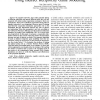Free Online Productivity Tools
i2Speak
i2Symbol
i2OCR
iTex2Img
iWeb2Print
iWeb2Shot
i2Type
iPdf2Split
iPdf2Merge
i2Bopomofo
i2Arabic
i2Style
i2Image
i2PDF
iLatex2Rtf
Sci2ools
GLOBECOM
2010
IEEE
2010
IEEE
Cooperation Stimulation in Cognitive Networks Using Indirect Reciprocity Game Modelling
In cognitive networks, since nodes generally belong to different authorities and pursue different goals, they will not cooperate with others unless cooperation can improve their own performance. Thus, how to stimulate cooperation among nodes in cognitive networks is very important. However, most of existing game-theoretic cooperation stimulation approaches rely on the assumption that the interactions between any pair of players are long-lasting. When this assumption is not true, according to the well-known Prisoner's Dilemma and the backward induction principle, the unique Nash equilibrium (NE) is to always play non-cooperatively. In this paper, we propose a cooperation stimulation scheme for the scenario where the number of interactions between any pair of players are finite. The proposed algorithm is based on indirect reciprocity game modelling where the key concept is "I help you not because you have helped me but because you have helped others". We formulate the prob...
Cognitive Networks | Communications | Cooperation Stimulation | Game-theoretic Cooperation Stimulation | GLOBECOM 2010 |
| Added | 11 Feb 2011 |
| Updated | 11 Feb 2011 |
| Type | Journal |
| Year | 2010 |
| Where | GLOBECOM |
| Authors | Yan Chen, K. J. Ray Liu |
Comments (0)

